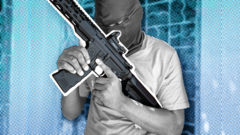A BBC investigation reveals the journey of smuggled American weapons and the chaos they breed in the Caribbean nation.
**US Arms Trafficking: Fueling Gang Violence in Haiti**

**US Arms Trafficking: Fueling Gang Violence in Haiti**
How lax laws in the US facilitate the flow of firearms to gang-controlled Haiti.
The recent seizure of assault rifles and pistols in Haiti has shed light on the troubling flow of US firearms to the Caribbean nation, now gripped by gang violence. An investigation by the BBC World Service and BBC Verify traced the shipment's journey, uncovering how lax regulations and corruption allow traffickers to bypass a UN embargo and feed an escalating arms race among gangs in Haiti.
The two cardboard boxes mounted with food and clothing landed in Cap-Haitien aboard the Rainer D cargo ship, coming from Fort Lauderdale, Florida. Haitian police disclosed that the boxes contained a staggering 12 assault rifles, 14 pistols, and nearly 1,000 rounds of ammunition. The investigation found that guns not manufactured in Haiti are likely procured from states like Florida, known as the "gunshine state," where private sellers could often sell firearms without mandatory background checks until 2024.
In an unsettling turn, it appears Haitian brothers residing in the US enlisted "straw buyers" to circumvent the law and purchase firearms. Anestin Predestin, who leased space within the shipment's container, expressed shock upon discovering that the seemingly innocuous boxes contained weapons intended for trafficking.
While the Florida-based shipping firm Alliance International Shipping has denied involvement in illicit trafficking, authorities note that out of the approximately 200 containers directed from South Florida to Haiti weekly, many remain unchecked. A former official with the Bureau of Alcohol, Tobacco, Firearms and Explosives voiced concern over the inadequacy of inspections on outgoing cargo, further allowing unchecked shipments to contribute to Haiti's security crisis.
The consequences of this unchecked arms flow have been catastrophic. Gang violence claims thousands of lives annually, with a staggering 5,601 killings reported in 2024 alone, and nearly 1 million people displaced due to violence. Trial victims like Wilson, who fled gunfire in Port-au-Prince, now live in temporary shelters, underscoring the urgency of the violence that has engulfed the capital.
Despite international intervention, including the deployment of at least 800 Kenyan police officers, the gangs continue to expand their influence, now controlling at least 85% of Port-au-Prince. Experts argue that the influx of firearms from the US is one of the main drivers of ongoing violence and instability within Haiti.
Reviewing shipping data, the BBC uncovered a potential network of trafficking involving 286 shipments linked to individuals sanctioned for suspected gang affiliations. However, efforts to curb this trafficking remain limited, with calls for stricter controls and accountability falling on deaf ears.
As the situation worsens, gun control advocates emphasize the need for better regulation and monitoring of firearm sales in the US to curtail trafficking operations that ultimately destabilize nations like Haiti. Though awareness is increasing, actual implementation of measures remains stagnant, with experts lamenting the failure to confront this growing crisis.
In a world where the flow of arms goes unchecked, Haiti’s plight serves as a stark reminder of the interconnectedness of violence and regulation, urging a re-examination of policies governing the international arms trade.
The two cardboard boxes mounted with food and clothing landed in Cap-Haitien aboard the Rainer D cargo ship, coming from Fort Lauderdale, Florida. Haitian police disclosed that the boxes contained a staggering 12 assault rifles, 14 pistols, and nearly 1,000 rounds of ammunition. The investigation found that guns not manufactured in Haiti are likely procured from states like Florida, known as the "gunshine state," where private sellers could often sell firearms without mandatory background checks until 2024.
In an unsettling turn, it appears Haitian brothers residing in the US enlisted "straw buyers" to circumvent the law and purchase firearms. Anestin Predestin, who leased space within the shipment's container, expressed shock upon discovering that the seemingly innocuous boxes contained weapons intended for trafficking.
While the Florida-based shipping firm Alliance International Shipping has denied involvement in illicit trafficking, authorities note that out of the approximately 200 containers directed from South Florida to Haiti weekly, many remain unchecked. A former official with the Bureau of Alcohol, Tobacco, Firearms and Explosives voiced concern over the inadequacy of inspections on outgoing cargo, further allowing unchecked shipments to contribute to Haiti's security crisis.
The consequences of this unchecked arms flow have been catastrophic. Gang violence claims thousands of lives annually, with a staggering 5,601 killings reported in 2024 alone, and nearly 1 million people displaced due to violence. Trial victims like Wilson, who fled gunfire in Port-au-Prince, now live in temporary shelters, underscoring the urgency of the violence that has engulfed the capital.
Despite international intervention, including the deployment of at least 800 Kenyan police officers, the gangs continue to expand their influence, now controlling at least 85% of Port-au-Prince. Experts argue that the influx of firearms from the US is one of the main drivers of ongoing violence and instability within Haiti.
Reviewing shipping data, the BBC uncovered a potential network of trafficking involving 286 shipments linked to individuals sanctioned for suspected gang affiliations. However, efforts to curb this trafficking remain limited, with calls for stricter controls and accountability falling on deaf ears.
As the situation worsens, gun control advocates emphasize the need for better regulation and monitoring of firearm sales in the US to curtail trafficking operations that ultimately destabilize nations like Haiti. Though awareness is increasing, actual implementation of measures remains stagnant, with experts lamenting the failure to confront this growing crisis.
In a world where the flow of arms goes unchecked, Haiti’s plight serves as a stark reminder of the interconnectedness of violence and regulation, urging a re-examination of policies governing the international arms trade.






















